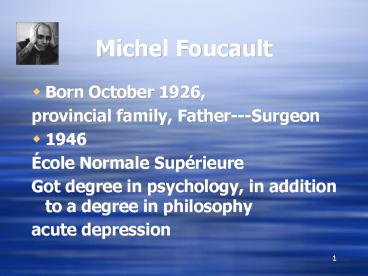Michel Foucault - PowerPoint PPT Presentation
1 / 24
Title:
Michel Foucault
Description:
Michel Foucault Born October 1926, provincial family, Father---Surgeon 1946 cole Normale Sup rieure Got degree in psychology, in addition to a degree in philosophy – PowerPoint PPT presentation
Number of Views:305
Avg rating:3.0/5.0
Title: Michel Foucault
1
Michel Foucault
- Born October 1926,
- provincial family, Father---Surgeon
- 1946
- École Normale Supérieure
- Got degree in psychology, in addition to a degree
in philosophy - acute depression
2
- Agrégation
- 1950 failed 1951 succeeded
- 1952 took up a position at the University of
Lille, taught psychology - from 1950 to 1953 French Communist Party
- inducted by Althusser
- 1954, University out of France
- Post-1968 as activist
3
- 1970,
- Collège de France, France's most prestigious
academic body, as Professor of the History of
Systems of Thought - 25 June, 1984
- Aids-Related illness Gilles Deleuze, obituary,
The Use of Pleasure, The curiosity for knowledge
4
- Madness and Civilization 1961
- Birth of the Clinic 1963
- The Order of Things 1966
- The Archaeology of Knowledge 1969
- The Order of Discourse 1971
- Discipline and Punish 1975
- The History of Sexuality
- Vol. I An Introduction 1976
- Vol. II The Use of Pleasure 1984
- Vol. III The Care of the Self 1984
5
Discipline Punish (1975)
- III. DISCIPLINE3. Panopticism
- Panoptic
- Panopticon
6
Plaguethe end of the 17th century
- A strict spatial partitioning
- Inspection
- Permanent registration
- Purifying
- Being observed
7
- The leper gave rise to rituals of exclusion
- the great Confinement
- the nineteenth century in the psychiatric
asylum??? , the penitentiary????? , the
reformatory??? , the approved school???? and, to
some extent, the hospital. - a double mode
- that of binary division and branding (mad/sane
dangerous/harmless normal/abnormal) - that of coercive assignment of differential
distribution
8
Bentham's Panopticon
- the architectural figure of this composition
- Full lighting and the eye of a supervisor capture
better than darkness, which ultimately protected.
- Visibility is a trap.
9
- an axial visibility
- a lateral invisibility
- the major effect of the Panopticon
- to induce in the inmate a state of conscious
and permanent visibility that assures the
automatic functioning of power.
10
- An important mechanism
- A real subjection
- Menagerie at Versailles
- Panopticon was also a laboratory
11
- The plague-stricken town, the panoptic
establishment - the differences are important. - It is polyvalent in its applications it serves
to reform prisoners, but also to treat patients,
to instruct schoolchildren, to confine the
insane, to supervise workers, to put beggars and
idlers to work.
12
- It makes it possible to perfect the exercise of
power - It's a case of 'it's easy once you've thought of
it' in the political sphere. - anyone may come and exercise in the central tower
the functions of surveillance
13
- The panoptic schema
- without disappearing
- spread throughout the social body
14
- How is power to be strengthened
- intensificator of power
- multiplicator of production
15
two images of discipline
- At one extreme, the discipline-blockade
- At the other extreme, with panopticism
- the Benthamite physics of power
16
extension of the disciplinary
- 1. The functional inversion of the disciplines.
- 2. The swarming of disciplinary mechanisms.
- 3. The state-control of the mechanisms of
discipline.
17
- this power had to be given the instrument of
permanent, exhaustive, omnipresent surveillance, - capable of making all visible, as long as it
could itself remain invisible.
18
'Discipline' may be identified neither with an
institution nor with an apparatus
- it is a type of power, a modality for its
exercise. - comprising a whole set of instruments,
techniques, procedures, levels of application,
targets it is a 'physics' or an 'anatomy' of
power, a technology.
19
the formation of a disciplinary society
- from
- the enclosed disciplines,
- a sort of social 'quarantine'
- to
- an indefinitely generalizable mechanism of
'panopticism'
20
Julius //a whole type of society emerges
- Antiquity had been a civilization of spectacle
- The modern age poses the opposite problem
21
We are much less Greeks than we believe.
- Our society is one not of spectacle, but of
surveillance - We are neither in the amphitheatre, nor on the
stage, but in the panoptic machine
22
The formation of the disciplinary
- 1. the disciplines are techniques for assuring
the ordering of human multiplicities - 2. the panoptic modality of power - is not under
the immediate dependence or a direct extension of
the great juridico-political structures of a
society - 3. the formation of knowledge and the increase of
power regularly reinforce one another in a
circular process
23
- Is it surprising that prisons resemble factories,
schools, barracks, hospitals, which all resemble
prisons ?
24
- George Orwell, 1948
- 1984
- Montesquieu,
- De l Esprit des Lois 1748
- Jean jacques Rousseau
- Du Contrat Social 1762































